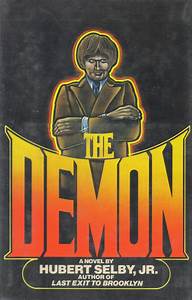 By HUBERT SELBY, JR. (Signet; 1976)
By HUBERT SELBY, JR. (Signet; 1976)
This is my favorite novel by the late Hubert Selby Jr., who’s best known for LAST EXIT TO BROOKLYN and REQUIEM FOR A DREAM. THE DEMON occupies a unique place in Selby’s oeuvre, being (I think) his most interesting book but also his most problematic.
Selby’s other novels are gritty evocations of big city desperation populated by whores, junkies, convicts and thugs—in short, the world the Brooklyn-bred Selby lived in and knew intimately. With THE DEMON Selby was for the first time exploring a world he didn’t know, that of corporate America. That he was unfamiliar with the milieu is evident in the curious lack of detail relating to just what it is the protagonist does. We’re informed at the beginning he works for an accounting firm, but from there all we really learn about the position is that it involves a lot of “work,” a word Selby uses to describe any number of labors.
Said protagonist is Harry White, an ambitious young man attempting to make his way in the corporate jungle. When we first meet Harry he has a compulsion for having sex with married women; it’s not necessarily the act itself that turns him on but the excitement that goes with it. Yet upon landing a plum position in the above-mentioned accounting firm Harry finds the same illicit thrill in hooking up with women during his lunch hour. This, however, quickly turns into an all-consuming obsession that nearly derails Harry’s momentum in the company.
He finds temporary serenity by falling love with a kind-hearted woman and getting married, which also has the effect of improving his work. But Harry’s inner peace is shattered when he thoughtlessly cheats on his wife, and he quickly finds himself once again craving the excitement that comes with illicit sexual encounters.
Being the ever-resourceful type he is, Harry discovers a new, asexual route to inner tranquility: by committing petty crimes around his office. But eventually this loses its novelty, leading Harry to broaden his criminal horizons to (you guessed it) cold-blooded murder.
Despite the foulness of his writing (the subject of more than one high-profile censorship case), Selby was a devout Christian, and THE DEMON represents the fullest expression of his religious convictions. The narrative is essentially a dramatization of the biblical quote that prefaces the book: “When lust hath conceived, it bringeth forth sin: and sin, when it is finished, bringeth forth death.” But the Christian iconography is laid on too thickly, particularly in the climax, which has Harry stabbing a cardinal—on Easter Sunday! This, as they say in Hollywood, is a little too “on the nose.”
Yet Selby also gets plenty of things right. THE DEMON is perhaps the ultimate fictional study of the corrosive effects of temptation, and Selby’s portrayal of Harry White’s inner desperation is terrifyingly convincing. The idea of sexual peccadilloes leading to madness and murder might seem outrageous, but Selby’s skill and conviction are such that the book often reads like an actual case study.
Selby’s prose, as in his other books, is feverish and volcanic. His style borders on experimental, in the free juxtaposition of dialogue and inner monologue, the unorthodox paragraph formatting (the indents tend to vary) and frequent misspellings (with backslashes in place of apostrophes). It is, however, one of the most distinct and arresting styles of any American writer, and is uniquely suited to this psychologically centered account.
So while THE DEMON may not excel in all areas, its compulsive readability, dead-on portrayal of psychosis and sheer forward momentum make for a novel of mind-rending power. The ultimate effect is harsh and devastating—quite simply put, THE DEMON is one of the roughest, most impacting books you’ll ever read.
